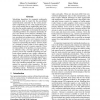Free Online Productivity Tools
i2Speak
i2Symbol
i2OCR
iTex2Img
iWeb2Print
iWeb2Shot
i2Type
iPdf2Split
iPdf2Merge
i2Bopomofo
i2Arabic
i2Style
i2Image
i2PDF
iLatex2Rtf
Sci2ools
109
click to vote
VLDB
1998
ACM
1998
ACM
Resource Scheduling for Composite Multimedia Objects
Scheduling algorithms for composite multimedia presentations need to ensure that the user-defined synchronization constraints for the various presentation components are met. This requirement gives rise to task models that are significantly more complex than the models employed in scheduling theory and practice. In this paper, we formulate the resource scheduling problems for composite multimedia objects and develop novel efficient scheduling algorithms drawing on a number of techniques from pattern matching and multiprocessor scheduling. Our formulation is based on a novel sequence packing problem, where the goal is to superimpose numeric sequences (representing the objects' resource needs as a function of time) within a fixed capacity bin (representing the server's resource capacity). Given the intractability of the problem, we propose heuristic solutions using a two-step approach. First, we present a "basic step" method for packing two composite object sequences...
Composite Multimedia | Database | Efficient Scheduling Algorithms | Scheduling Algorithms | VLDB 1998 |
Related Content
| Added | 06 Aug 2010 |
| Updated | 06 Aug 2010 |
| Type | Conference |
| Year | 1998 |
| Where | VLDB |
| Authors | Minos N. Garofalakis, Yannis E. Ioannidis, Banu Özden |
Comments (0)

